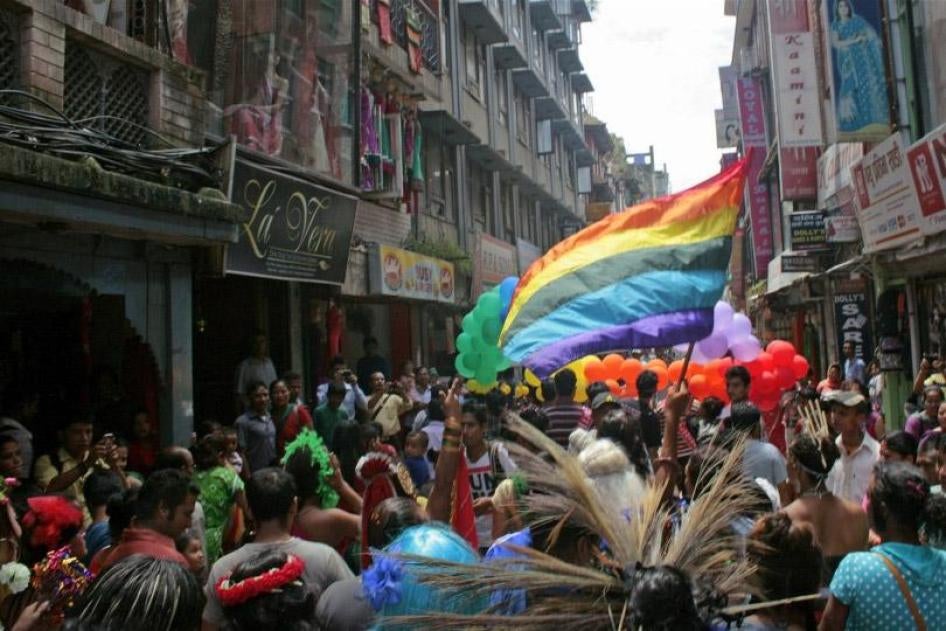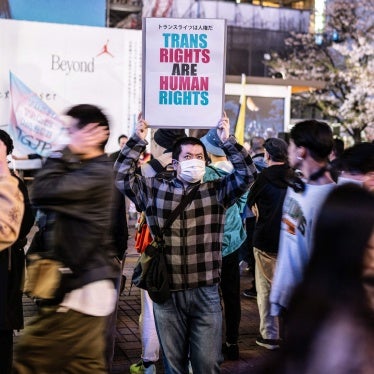When Nepal's president signed the country’s new constitution on September 20, some minority groups raised black flags in protest; #NotMyConstitution trended on social media. The national charter was imbued with aspirations of inclusion that have long been brewing in Nepali society, including a people’s movement that toppled the world’s last remaining Hindu monarchy in 2008. But the new constitution, delivered by a predominantly high-caste male administration, ultimately fell short of previous pledges for long-promised state restructuring, enraging many disenfranchised groups, including women and the ethnic minorities.
But for one minority group in the impoverished country of 27 million, there was a silver lining. Nepal became only the 10th country in the world to enshrine specific protections for LGBT people in its constitution. The path to constitutional protection for a group at times openly derided as “social pollutants” was neither linear nor predictable, and took a unique combination of courage and political wisdom. It is reflected in the rise of Sunil Pant, who in 2001 was an unemployed computer engineering graduate handing out condoms in a dusty Kathmandu park, and who seven years later became Asia’s first openly gay national-level elected official when he was voted into the Constituent Assembly — a 601-person chamber charged with drafting the new constitution.
Engaging the law was crucial; Nepal was never colonized, and its central legal system is an expansive code combining civil and criminal law. One-third of the 700-page original 1854 draft addressed the exchange of food and sex between castes. A major revision in the 1960s modernized it, and introduced a shadow of a colonial-era sodomy law with a clause forbidding “unnatural sex.” Ram Krisna Timalsena, a leading law scholar in Kathmandu, says that the clause was probably included in part to distil multiple elements of the sex-heavy original code, and in part because at that time most Nepali lawyers had trained in India, where they became familiar with India’s colonial-era penal code and its anti-sodomy law.
Still, sexuality could provoke moral panic. When Pant attempted to register his “Blue Diamond Society” as an LGBT-rights nongovernmental organization in 2001, a government clerk told him to delete the word “homosexuality.” To circumvent this feedback, he instead called it a “sexual health and rights” organization.
Meanwhile, Blue Diamond expanded its work amid an intensifying civil armed conflict. Many of its early constituents were “metis” — people identified as male at birth but who developed feminine identities and appearances. Some did sex work on Kathmandu’s streets. With frequent curfews, the metis found customers among security forces who patrolled at night, but also suffered violence and harassment from the armed men. In a particularly egregious incident, in August 2004, a police officer slit a meti’s throat after forcing her to perform oral sex.
As Blue Diamond’s ranks swelled and its visibility grew through events such as pride parades, Pant joined an increasingly active network of global LGBT rights activists. He was invited in 2006 to negotiate and sign the Yogyakarta Principles, the first document to interpret international human rights standards as they applied to sexual orientation and gender identity. Pant took the Principles to a lawyer to formulate a Supreme Court petition asking for full LGBT rights recognition.
In a society with a densely patriarchal legal system, where homosexuality was still not discussed openly, that was no easy task. There were only a handful of relevant international examples to draw on as well at that time.
Hari Phuyal, the lawyer Pant convinced to take the case, told me that he read all of the case law he could find. Perhaps more important, he said: “I spoke in the court with all of the different documents resting under my hand so the judges could see that what I was talking about was real.”
As Blue Diamond grew increasingly bold in fighting back against violence and demanding public visibility, its claims to an identity category gained currency. The group embraced an ambiguity that allowed it to be both flexible and tactical.
For example, three days after the police officer slit the meti’s throat in 2004, police arrested 39 Blue Diamond members and detained them without charge. A BBC article on the event referred to the detainees as “gays and transsexuals;” Amnesty International called them “transvestites;” the UN used “sexual minorities” and other international outcry ranged from “39 homosexual [men]” to “gendered males who are feminised.”
In 2007 when the court issued its judgment in Pant’s Yogyakarta Principles case, it ordered the government to take three steps: audit all laws and scrap those that discriminated against LGBT people; form a committee to study same-sex marriage legislation; and legally recognize a “third gender” category based on an individual’s own self-identification. Judicial precedent has few teeth in Nepal. But as an augur of public opinion, the case resonated well. It also propelled Pant to a new level of political legitimacy, representing an increasingly visible and popularly comprehensible minority.
In May 2008, when Pant arrived at the opening session of Nepal’s first Constituent Assembly, he was in some ways an unremarkable addition to what the UN country office at the time called “Nepal’s most representative elected body to date.” One third of its members were women; 49 were Dalit (so-called “untouchables”). Pant’s profile as a Brahmin male from the middle hills positioned him in the traditional ruling class. Quietly, the gaunt 36-year-old had just become the first openly queer federal legislator in all of Asia.
He joined the committee charged with drafting the constitution’s fundamental rights chapter and began soliciting allies along axes of difference — people who had divorces or disabilities in their families, for example.
But perhaps his deftest approach was in his optics. In the initial draft, he had inserted “sexual and gender minorities” in a section on social protection, and “sexual orientation” in a section on non-discrimination. During a discussion on revisions, he suggested changing the order of the words to “gender and sexual minorities.” “The committee members actually applauded,” Pant told me, smirking. “And then they started using the phrase, whereas before they would mumble it when they spoke.”
There was similar resonance in compliance with the court’s 2007 orders. In response to the first, over 100 laws were identified that needed to be changed; then a committee issued its report in early 2015, effectively recommending the legalization of same-sex marriage. But neither gained as much traction as the third-gender category. By 2010, the Election Commission had added a third tick-box to voter rolls, and immigration forms followed swift suit. The 2011 federal census, a major bellwether for post-war social inclusion gains, included a third-gender category.
Capacious as it is, the third-gender category’s legal battle gained traction in part because it carried historical echoes of South Asia’s hijara culture. But it was also a powerful method because it allowed Blue Diamond to advocate for inclusion on terms familiar to the sclerotic Nepali bureaucracy: via citizenship documents, passports, and survey data. Small administrative gains could be celebrated as major victories, uplifting spirits inside the movement and in a government quite weary of pesky civil society.
Nepal’s new constitution fails on many minority rights. But it joins Bolivia’s and Ecuador’s in specifically protecting gender identity. Although a reference to “sexual orientation” was dropped from the non-discrimination clause at the last minute, gay and lesbian people appear in the enumeration of disadvantaged groups and those guaranteeing participation in state mechanisms — by a reference to “gender and sexual minorities.”









